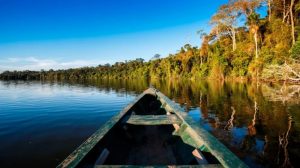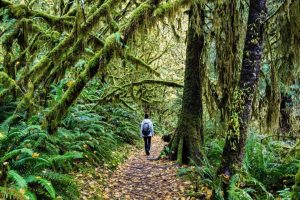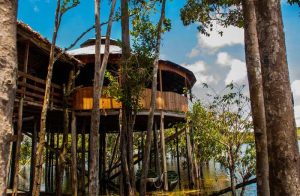
Rainforest eco-lodges and accommodations set the stage for an unforgettable journey, offering a unique blend of sustainability and adventure in the heart of lush greenery. Get ready to explore the wonders of eco-friendly stays in the midst of nature’s embrace!
As we delve deeper into the realm of rainforest eco-lodges and accommodations, prepare to be amazed by the harmonious coexistence of comfort and conservation in these hidden gems of the wild.
Rainforest Eco-Lodges and Accommodations
Rainforest eco-lodges are accommodations that are built and operated with a focus on minimizing their impact on the surrounding environment. These eco-lodges are designed to coexist harmoniously with the rainforest ecosystem, often using sustainable materials and practices.Sustainable practices in eco-lodges are crucial for preserving the delicate balance of the rainforest environment. By implementing measures such as energy-efficient design, waste reduction, and water conservation, eco-lodges help protect the biodiversity and natural resources of the rainforest.
Examples of Eco-Lodges in Rainforest Environments
- 1. The Gibbon Experience in Laos: This eco-lodge is nestled within the Bokeo Nature Reserve and offers treehouse accommodations that are built high in the canopy to minimize impact on the forest floor.
- 2. Pacuare Lodge in Costa Rica: Situated along the Pacuare River, this eco-lodge features bungalows that blend seamlessly with the surrounding rainforest, providing guests with an immersive experience in nature.
- 3. Daintree Ecolodge in Australia: Located in the UNESCO-listed Daintree Rainforest, this eco-lodge is designed to showcase sustainable architecture and practices while allowing guests to connect with the unique ecosystem.
Benefits of Staying in Eco-Lodges
- Eco-lodges offer travelers a chance to experience the beauty of the rainforest while minimizing their environmental footprint.
- By supporting eco-friendly accommodations, travelers contribute to the conservation efforts of the rainforest ecosystem.
- Staying in eco-lodges promotes sustainable tourism practices and educates guests on the importance of preserving natural habitats.
Mountain Travel
When it comes to mountain travel, eco-lodges offer a unique experience compared to those in rainforest regions. The serene mountainous landscapes provide a different backdrop for sustainable accommodations, with their own set of challenges and eco-friendly practices.
Differences Between Eco-Lodges in Rainforests and Mountainous Regions
In rainforest eco-lodges, guests are immersed in lush greenery and vibrant wildlife, while mountain eco-lodges offer stunning views of peaks and valleys. Rainforest lodges focus on preserving biodiversity, while mountain lodges often prioritize energy efficiency and waste management due to their remote locations.
Challenges Faced by Eco-Lodges in Mountainous Areas
Eco-lodges in mountainous regions face challenges such as harsh weather conditions, limited access to resources, and the need to minimize their ecological footprint in fragile ecosystems. They must also consider snowmelt runoff, soil erosion, and protection of alpine habitats.
Examples of Eco-Friendly Practices in Mountain Eco-Lodges
- Implementing renewable energy sources like solar panels or hydroelectric power
- Using locally sourced materials for construction to reduce carbon footprint
- Promoting water conservation through low-flow fixtures and greywater recycling systems
The Appeal of Sustainable Accommodations for Mountain Travelers
Mountain travelers are drawn to eco-friendly lodges for the opportunity to connect with nature in a responsible way. The peace and tranquility of mountain landscapes combined with sustainable practices create a unique and rejuvenating experience for those seeking a more mindful approach to travel.
Desert Travel
Desert travel offers a unique experience compared to rainforest adventures. The arid landscapes present challenges and opportunities for eco-lodges seeking to operate sustainably in these harsh environments.
Feasibility of Eco-Lodges in Deserts
Setting up eco-lodges in deserts comes with its own set of challenges, such as scarcity of water and extreme temperatures. However, with proper planning and innovative solutions, it is possible to create sustainable accommodations that blend seamlessly with the desert environment.
Water and Energy Conservation in Desert Eco-Lodges
- Utilizing solar panels for energy generation
- Implementing greywater recycling systems
- Xeriscaping to reduce water usage in landscaping
Design Elements for Sustainable Desert Eco-Lodges
- Earth-friendly construction materials to regulate indoor temperatures
- Optimizing natural ventilation for cooling
- Using shading elements to reduce heat gain
Cultural Experiences in Desert Eco-Lodges
Guests at desert eco-lodges can immerse themselves in the rich cultural heritage of the region through activities such as desert safaris, stargazing, and interactions with local communities. These experiences offer a deeper understanding of desert life and traditions.
Arctic & Polar Travel
The Arctic and polar regions present unique sustainability challenges for eco-lodges due to extreme weather conditions, fragile ecosystems, and limited access to resources. Eco-friendly accommodations in these areas must be designed to minimize environmental impact while providing comfort to guests.
Sustainability Challenges
In Arctic and polar regions, eco-lodges face challenges such as limited access to renewable energy sources, proper waste management in remote areas, and the potential impact of tourism on local wildlife and habitats. To address these challenges, eco-lodges in these regions utilize innovative technologies and sustainable practices.
- Energy-Efficient Heating Systems: Eco-lodges in Arctic areas often use energy-efficient heating systems such as geothermal heating, solar panels, and insulation to reduce energy consumption and minimize greenhouse gas emissions.
- Water Conservation Measures: To conserve water in cold climates, eco-lodges may implement water-saving fixtures, collect and treat rainwater, and promote responsible water usage among guests.
- Zero Waste Initiatives: Eco-lodges in polar regions aim to minimize waste generation through recycling programs, composting, and reducing single-use plastics to protect the delicate Arctic environment.
Community Involvement
Community involvement is crucial in operating eco-lodges in Arctic areas to ensure sustainable practices and support local economies. Examples of community involvement include partnering with indigenous communities for traditional knowledge, hiring local staff, and engaging in cultural exchange programs with guests.
- Traditional Knowledge Sharing: Eco-lodges collaborate with indigenous communities to incorporate traditional knowledge and practices into their operations, respecting local customs and preserving cultural heritage.
- Local Employment Opportunities: By hiring local staff, eco-lodges contribute to the economic development of Arctic communities and empower residents with job opportunities in the tourism industry.
- Cultural Exchange Programs: Eco-lodges offer cultural exchange programs for guests to interact with local communities, learn about Arctic traditions, and support sustainable tourism practices.
Preserving Fragile Ecosystems
Preserving fragile Arctic ecosystems through eco-friendly accommodations is essential to protect biodiversity, mitigate climate change impacts, and promote responsible tourism in polar regions. Eco-lodges play a vital role in raising awareness about environmental conservation and supporting conservation initiatives.
- Biodiversity Conservation: Eco-lodges in Arctic areas implement measures to protect wildlife habitats, reduce disturbance to native species, and promote ecotourism activities that respect the natural environment.
- Climate Change Mitigation: By reducing carbon footprints, promoting sustainable transportation options, and supporting renewable energy projects, eco-lodges contribute to mitigating climate change impacts in the Arctic region.
- Educational Programs: Eco-lodges organize educational programs, guided tours, and nature walks to educate guests about Arctic ecosystems, climate change challenges, and the importance of preserving fragile environments for future generations.
Jungle & Rainforest Travel

Exploring the lush jungles and vibrant rainforests offers a unique travel experience that traditional hotels cannot match. Immersive stays in eco-lodges nestled within these natural wonders provide a deeper connection to the environment and its wildlife.
Accommodations Comparison
While traditional hotels offer comfort and luxury, rainforest eco-lodges provide a more authentic and sustainable experience. These lodges are designed to blend with the surroundings, allowing guests to be fully immersed in the sights and sounds of the jungle.
Benefits of Immersive Experiences
Staying in jungle eco-lodges allows travelers to truly disconnect from the hustle and bustle of city life. The sounds of the rainforest become a lullaby, and the sights of exotic flora and fauna are just outside the door. This closeness to nature can be rejuvenating for the mind and soul.
Role in Biodiversity Conservation
Eco-lodges play a crucial role in promoting biodiversity conservation in rainforests. By supporting these sustainable accommodations, travelers contribute to the preservation of fragile ecosystems and help protect the habitats of countless species.
Guests’ Wildlife Encounters
Many guests have unforgettable encounters with wildlife while staying in jungle eco-lodges. From waking up to the calls of howler monkeys to spotting colorful birds and elusive big cats on guided hikes, these experiences create lasting memories and a greater appreciation for the natural world.
Coastal & Beach Travel

When it comes to eco-lodges, coastal beaches offer a unique environment compared to rainforests. While both locations emphasize sustainability and eco-friendly practices, there are distinct differences in the challenges and opportunities they present. Eco-lodges on coastal beaches often have to contend with the effects of rising sea levels, erosion, and saltwater intrusion, which can impact their operations and infrastructure.
Similarities and Differences
- Similarities:
- Focus on sustainability and eco-friendly practices
- Connection to nature and local communities
- Offering unique experiences for guests
- Differences:
- Coastal eco-lodges face challenges like rising sea levels and erosion
- Rainforest eco-lodges deal with issues like biodiversity conservation and habitat protection
- Activities and experiences are tailored to the specific environment of each location
Sustainable Practices
- Implementing renewable energy sources such as solar power
- Using recycled or locally sourced materials for construction
- Reducing water consumption through efficient systems and practices
- Supporting local communities through employment and sourcing goods
Impact of Rising Sea Levels
- Coastal eco-lodges are at risk of erosion and flooding due to rising sea levels
- Adaptation strategies may include elevating structures, creating natural barriers, or relocating further inland
- Collaboration with local authorities and communities is essential for long-term resilience
Recreational Activities
- Water sports such as surfing, snorkeling, and kayaking
- Beach yoga and meditation classes
- Nature walks along the coastline and birdwatching tours
- Community beach clean-up initiatives and conservation projects
Final Wrap-Up
In conclusion, Rainforest eco-lodges and accommodations open the door to a world where luxury meets sustainability, inviting travelers to be a part of a greater conservation story while indulging in the beauty of nature. It’s a stay you won’t forget!
Question & Answer Hub
Are eco-lodges in rainforests more expensive than traditional hotels?
Not necessarily. While some eco-lodges may have higher rates due to their sustainable practices, there are also budget-friendly options available that offer a unique experience in the rainforest.
Do eco-lodges in rainforests have electricity and modern amenities?
Yes, many eco-lodges are equipped with electricity generated from renewable sources and offer modern amenities to ensure a comfortable stay without compromising on sustainability.
How can I contribute to the conservation efforts while staying in a rainforest eco-lodge?
You can support conservation by following eco-friendly practices, respecting the environment, and participating in any conservation activities or programs offered by the eco-lodge.





